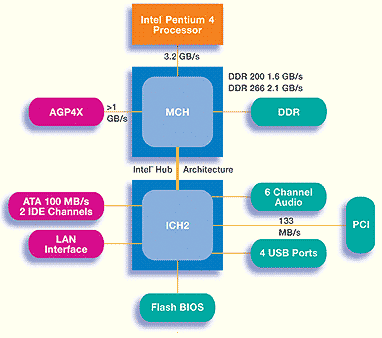Intel's Strike Force: 19 DDR-Motherboards With 845 Chipset and DDR-Support
ECC
Generally, ECC memory (error correcting code) is uninteresting for home use. These modules have 72 instead of 64 Bits and are able to correct single bit errors. From a hardware point of view, using this special memory ensures the best stability. But ECC has to be supported by both the chipset and the BIOS. Unfortunately, only 5 of the 19 tested motherboards support ECC, though the 845 chipset would support it. Just one more note: with ECC enabled, your performance will decrease by approximately 1% to 2% - if you want it, that's the price for maximum hardware stability.
For servers, this kind of memory is strongly recommended, as it contributes to optimum system availability. For home use, buying these modules is rather senseless, since typical Windows systems are stuffed with software and tend to be groggy anyway - even more than the memory could ever be.
What Would You Like Today? Chipset Features In Detail
Intel chipsets still are considered to be reference products - both in terms of reliability and of technical features. All boards share the features that come with the chipset:
- AGP 4x Interface
- DDR memory controller for PC2100 (DDR266)
- *South Bridge resp. I/O Controller Hub 82801BA, includingUltraATA/100 IDE controller for 4 devices max.two USB controllers with 2 ports eachLAN interface for easy attachment to 10/100 Mbit networksAC97 controller for easy implementation of sound systemsCNR port for unexpensive expansion by a LAN/modem/sound riser card32 Bit PCI bus (max. 6 slots)

You can find more information about the 845 chipset on Intel's website and in the following technology review: Intel Goes DDR - Do We Really Care? .
Stay on the Cutting Edge
Join the experts who read Tom's Hardware for the inside track on enthusiast PC tech news — and have for over 25 years. We'll send breaking news and in-depth reviews of CPUs, GPUs, AI, maker hardware and more straight to your inbox.
Current page: ECC
Prev Page DDR Only With CL2! Next Page What Do You Like Today? Additional FeaturesMost Popular

